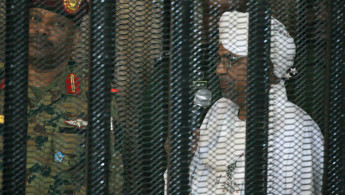Follow us on Twitter: @The_NewArab
Sudan protest group has 'no objection' to handing Bashir to ICC
The protest movement that led to the ouster of Sudan's longtime president Omar al-Bashir said Sunday it was not against handing over the deposed autocrat to the International Criminal Court to be tried for genocide.
Bashir, who was ousted by the army in April after a nationwide agitation against his rule, has long been accused by the Hague-based ICC of genocide, war crimes and crimes against humanity for his alleged role in the devastating conflict in Sudan's Darfur region.
"We have no objection in handing over Bashir to the ICC," Ibrahim Al-Sheikh, a leader of umbrella protest movement the Forces of Freedom and Change, told reporters late on Sunday.
"All the members of the Forces of Freedom and Change agree on that."
Global rights groups, rebel factions who fought Bashir's forces over the years and activists have consistently demanded that the former leader be handed over to the ICC.
After he was deposed on April 11, ICC prosecutors once again demanded Bashir stand trial for mass killings in Darfur.
The military generals who had initially seized power in the aftermath of the president's fall have refused to hand him over to the ICC.
Read more: Sudan makes history as Neemat Abdullah Kheir appointed first ever female judiciary chief
The country has since August been ruled by a joint civilian-military sovereign council, which includes leaders of the protest umbrella.
The body is tasked with overseeing the transition to full civilian rule.
The transitional authorities would need to ratify the ICC's Rome Statute to allow for the transfer of the ousted ruler to the Hague.
The Darfur conflict flared in 2003 when ethnic African rebels took up arms against the then Arab-dominated government of Bashir, accusing it of marginalising the region economically and politically.
Khartoum then applied what rights groups say was a scorched earth policy against ethnic groups suspected of supporting the rebels - raping, killing, looting and burning villages.
About 300,000 people have been killed and 2.5 million displaced in the conflict, the United Nations says.
Bashir is now being held in a prison in Khartoum, and is facing trial on corruption charges.
He ruled Sudan for three decades after seizing power in an Islamist backed coup in 1989.
Twitter Post
|





 Follow the Middle East's top stories in English at The New Arab on Google News
Follow the Middle East's top stories in English at The New Arab on Google News
![Israeli forces ordered bombed Gaza's Jabalia, ordering residents to leave [Getty]](/sites/default/files/styles/image_330x185/public/2176418030.jpeg?h=a5f2f23a&itok=_YGZaP1z)

